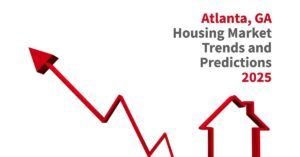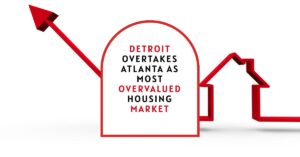Thinking about buying or selling a home in Atlanta? You're not alone! It's a big decision, and understanding the current Atlanta housing market trends is crucial for making informed choices. In short, while sales are down slightly, home prices in Atlanta are still holding strong, fueled by a healthy, but growing, inventory. Let's dive deeper and break down what's happening in the Atlanta real estate scene right now.
Current Atlanta Housing Market Trends: What You Need to Know in 2025
Home Sales
Let's start with the raw numbers. According to the Atlanta REALTORS® Association's February 2025 Market Brief, February residential sales in metro Atlanta reached 3,516 units. Now, that might sound like a lot, but it's actually a 10.7% decrease compared to February of the previous year. This could be due to a number of factors like continued high-interest rates impacting affordability.
Home Prices
Even though sales are down a bit, the story with home prices is a bit more complex. Here's what the February 2025 numbers tell us:
- Median Sales Price: $415,000 – essentially flat (0.0% change) from February 2024.
- Average Sales Price: $517,000 – up a 4.8% from the previous year.
As you can see, average prices are up. This suggests that while the middle range of the market remains relatively stable (median), there could be more activity or demand at the higher end, pushing the average sales price up.
Are Home Prices Dropping in Atlanta?
This is the million-dollar question (or, perhaps in Atlanta, the half-a-million-dollar question!). The short answer is no, not significantly. While the median sales price is essentially unchanged from last year, we're not seeing a sharp decline. The average price is actually up compared to last year. This suggests the Atlanta housing market is still competitive and holding its own, even amidst economic uncertainties.
Comparison with Current National Median Price
Let's put Atlanta's housing market in perspective by comparing it to the national median home price. The current national median price (February 2025) is $398,400, with a year-over-year change of +3.8%.
So, Atlanta's median price of $415,000 is higher than the national median. This isn't necessarily surprising, as Atlanta is a major metropolitan area with a strong job market and desirable amenities. Also note, the Atlanta median is flat while the national median is up 3.8%. This suggests that Atlanta market is not growing as fast as the national market.
Housing Supply
One of the key factors influencing home prices is the housing supply. A limited supply typically drives prices up, while a larger supply can put downward pressure on prices. Here's the situation in Atlanta:
- Total housing inventory in February 2025 was 15,858 units, which represents a significant 44.0% increase from February 2024.
- New listings totaled 7,328, up 7.0% from February 2024 and up 0.8% from the previous month.
- The month’s supply over a 12-month period remained the same at 3.5 months.
The good news for buyers is that inventory is up significantly. A 44% jump is a big deal. This means buyers have more choices and potentially more negotiating power. However, with only 3.5 months of supply, we're still not in a balanced market (typically considered 5-6 months). We're still technically in a seller's market, or at least a seller's market that is leaning towards being a balanced market.
Is Atlanta a Buyer's or Seller's Housing Market?
Given the current data, the Atlanta market is arguably balanced. While inventory is increasing, it still isn't as high as it needs to be to be a buyer's market. Prices are stable at the median level. However, considering interest rates, the market could be leaning towards a buyer's market. It's more nuanced than simply saying it's one or the other. It depends on the specific area, price point, and property type.
| Factor | Data | Impact |
|---|---|---|
| Home Sales | Down 10.7% year-over-year | Could indicate less buyer demand or hesitation due to interest rates and uncertainty |
| Median Home Price | $415,000 (0.0% change) | Stable prices suggest neither a strong buyer's nor seller's advantage |
| Average Home Price | $517,000 (Up 4.8%) | Suggests the top end of the market has more demand |
| Housing Inventory | Up 44.0% year-over-year | Gives buyers more options, but still limited. |
| Months Supply | 3.5 months | Still favors sellers slightly, but improving for buyers |
Market Trends
Here are some broader trends I'm seeing in the Atlanta housing market:
- Suburban Shift Continues: While Atlanta's urban core remains desirable, many buyers are still drawn to the suburbs for larger lots, better schools, and a more relaxed lifestyle.
- Interest Rate Sensitivity: As I said earlier, buyers are very sensitive to interest rate changes. Even small increases can significantly impact affordability and slow down sales.
- The Rise of Renters: High home prices and rising interest rates are pushing some potential buyers into the rental market, increasing demand for rental properties.
Impact of High Mortgage Rates
Speaking of interest rates, they're a major factor in the current market. Currently, in March 2025, the average 30-year fixed mortgage rate is around 6.67% and 15-Yr FRM is about 5.83%, according to Primary Mortgage Market Survey® by Freddie Mac.
Most forecasts predict mortgage rates to remain at or slightly above this level for the near future. This has a direct impact on:
- Affordability: Higher rates mean higher monthly payments, making it harder for some people to afford a home.
- Buyer Demand: As mentioned, increased rates generally lead to a decrease in buyer demand, which can slow down sales and put downward pressure on prices.
- Refinancing: Many homeowners are hesitant to refinance their existing mortgages because current rates are higher than what they're already paying.
In summary, the Atlanta housing market in 2025 is a dynamic and complex one. While sales are down slightly and interest rates remain elevated, home prices are remaining relatively stable, particularly on the median side. Inventory is increasing, giving buyers more options. It's neither a strong buyer's nor a strong seller's market, but rather a market in transition.
Atlanta Housing Market Forecast 2025-2026
What's Next for Home Prices? The short answer is: expect a slow and steady climb. According to the latest data, Atlanta home values are predicted to increase modestly over the next year. While a drastic crash isn't anticipated, understanding the nuances of the market is crucial for making informed decisions.
Currently, the average home value in the Atlanta-Sandy Springs-Roswell metro area is around $376,333. This reflects a 0.6% increase over the past year. While the market isn't experiencing the explosive growth seen in recent years, prices are still holding steady. Homes are going under contract in around 50 days, which indicates a relatively balanced market.
Atlanta Home Price Predictions
Let's dive into some specific forecasts. Zillow's latest data, current as of February 2025, offers insights into the near future:
- March 2025 Prediction: A slight dip of 0.1% is expected. This could be a minor correction or seasonal fluctuation.
- May 2025 Prediction: A small rebound is anticipated, with a projected increase of 0.1%.
- One-Year Forecast (February 2025 to February 2026): Zillow predicts a more substantial gain of 1.4% over the next year. This suggests that while there might be some short-term fluctuations, the overall trend is upward.
Comparing Atlanta to Other Georgia Markets
How does Atlanta's projected growth compare to other cities in Georgia? Here's a quick look, based on Zillow's forecasts for the same period:
| Region | March 2025 Change | May 2025 Change | Feb 2025 – Feb 2026 Change |
|---|---|---|---|
| Atlanta, GA | -0.1% | 0.1% | 1.4% |
| Augusta, GA | 0% | 0.5% | 1.4% |
| Savannah, GA | 0% | 0.3% | 2.6% |
| Columbus, GA | 0.2% | 0.7% | 1.6% |
| Macon, GA | -0.1% | 0.3% | 1.6% |
| Athens, GA | 0.3% | 1.0% | 3.2% |
| Gainesville, GA | 0.1% | 0.7% | 3.0% |
| Warner Robins, GA | 0.3% | 1.0% | 2.4% |
| Albany, GA | 0.2% | 1.2% | 2.9% |
As you can see, Atlanta's growth forecast is generally more conservative than some other areas in Georgia. This could be due to its already higher home values and larger market size.
Will Atlanta Home Prices Crash?
Based on the available data and current market conditions, a housing market crash in Atlanta seems unlikely. While there are always economic uncertainties, the forecast suggests a more gradual appreciation. Several factors contribute to this stability, including:
- A growing population
- A strong job market
- Relatively low inventory of homes
My Thoughts on the 2026 Housing Market
While it's difficult to predict beyond a year with certainty, I believe the Atlanta housing market will likely continue on a moderate upward trajectory into 2026. Factors like interest rates and economic growth will play a significant role. If interest rates remain stable or decrease, it could fuel more buyer demand. However, any significant economic downturn could dampen the market. In my opinion, expect a slow, steady appreciation rather than a dramatic surge.
What this Means for You
- Buyers: Don't expect prices to plummet. Focus on finding a home that fits your budget and long-term needs.
- Sellers: The market is still favorable, but pricing your home competitively is essential.
Ultimately, understanding the trends and forecasts will help you make sound decisions in the Atlanta housing market.
Top Reasons To Invest In The Atlanta Real Estate Market in 2025?
Investing in the Atlanta real estate market offers a myriad of advantages and opportunities. Here are the top reasons why Atlanta is a compelling destination for real estate investors:
Economic Growth
- Thriving Job Market: Atlanta is a major economic hub with a diverse job market. It's home to numerous Fortune 500 companies and has a booming tech sector, creating a consistent demand for housing.
- Population Growth: The city's population is steadily increasing, attracting both young professionals and families, further fueling the demand for housing.
Affordability
- Cost of Living: Atlanta offers a relatively affordable cost of living compared to many other major cities, making it an attractive destination for those seeking quality housing without exorbitant price tags.
- Investment Opportunities: Investors can find properties at various price points, catering to both entry-level and luxury markets.
Steady Appreciation
- Price Appreciation: Atlanta has experienced steady and sustainable home price appreciation over the years, offering the potential for long-term investment gains.
- Historical Performance: The city has weathered economic downturns well, with real estate values generally holding up even during challenging times.
Diverse Neighborhoods
- Varied Neighborhoods: Atlanta boasts diverse neighborhoods, each with its own unique character, catering to different preferences and lifestyles.
- Growth Potential: Some neighborhoods are undergoing revitalization, presenting opportunities for investors to benefit from future development.
Strong Rental Market
- Rental Demand: Atlanta has a robust rental market, driven by its transient population and a consistent influx of students and professionals.
- Income-Producing Assets: Real estate can be a reliable source of passive income, making it an appealing choice for investors seeking cash flow.
Quality of Life
- Cultural Attractions: Atlanta offers a rich cultural scene with world-class museums, theaters, and entertainment options.
- Education: The city is home to renowned universities and schools, making it attractive for families seeking quality education.
Pro-Business Environment
- Business-Friendly Policies: Georgia is known for its business-friendly policies and incentives, which can positively impact the overall economic climate and real estate market.
- Investor-Friendly Laws: The state's landlord-friendly regulations make property management more straightforward for investors.
These factors collectively contribute to Atlanta's status as a dynamic and promising real estate market, making it a compelling choice for investors looking to benefit from both short-term gains and long-term stability.
Remember, investing in the Atlanta real estate market can offer a wealth of opportunities, whether you're a seasoned investor or new to the world of real estate.
Work with Norada, Your Trusted Source for
Turnkey Real Estate Investing in “Atlanta, GA”
Discover high-quality, ready-to-rent properties designed to deliver consistent returns.
Contact us today to expand your real estate portfolio with confidence.
Contact our investment counselors (No Obligation):
(800) 611-3060
Read More:
- Top Reasons To Buy Atlanta Investment Properties in 2025
- Where to Buy Atlanta Investment Properties in 2025?
- Housing Market Trends: Big Investors Buy in Atlanta, Dallas, Charlotte, Houston
- CoreLogic Flags Atlanta and Spokane as High-Risk Housing Markets
- Detroit Overtakes Atlanta as Most Overvalued Housing Market
- Best Places to Buy a House in 2025: Up-and-Coming Markets
- Georgia Housing Market: Trends and Predictions
- Best Places to Live in Georgia for Families in 2024 and 2025




